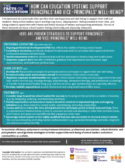How Can Education Systems Support Principals’ and Vice-Principals’ Well-Being?
Principals and vice-principals often sacrifice their own happiness and well-being to support their staff and students.
Download, print, and share this fact sheet! (7.50 MB / pdf)
DownloadPrincipals and vice-principals often sacrifice their own happiness and well-being to support their staff and students. Many school leaders report working long hours, skipping lunch, feeling isolated in their roles, and being unable to spend time with friends and family because of intense and expanding workloads. The toll of these demands can leave school leaders feeling emotionally and physically exhausted.
HERE ARE PROVEN STRATEGIES TO SUPPORT PRINCIPALS’ AND VICE-PRINCIPALS’ WELL-BEING
PROFESSIONAL ASSOCIATIONS can advocate for:
- Ongoing professional development (PD) that reflects the realities of being a school leader.
- Coaching or mentoring specifically designed for principals and vice-principals that supports both their professional and personal well-being.
- Health assessment tools that allow principals and vice-principals to develop long-term health plans.
- Telephone support lines that offer confidential guidance from experienced school leaders, legal representatives, and healthcare professionals.
SCHOOL DISTRICTS can:
- Develop PD that provides strategies for principals and vice-principals to support their own well-being.
- Promote healthy work environments overall for all members of the school community.
- Negotiate employee health benefits that support school leaders’ well-being and encourage them to be used fully. Health services (e.g. massage therapy, physiotherapy, chiropractic therapy, and professional counseling) or benefits that promote healthy living (e.g. nutrition services, gym memberships) are especially effective.
- Develop realistic expectations around remote work and using email beyond office hours.
POLICYMAKERS can:
- Consider ways to position school leaders for success by focusing on their priorities as leaders of learning (e.g. by delegating, reducing, and eliminating workload).
- Clarify expectations on how school leaders should be involved in implementing new and ongoing initiatives (e.g. those related to mental health, cyberbullying, technology leadership).
- Assess options to reduce the time principals and vice-principals spend on lunch and yard duty. There is ongoing tension between being on duty to supervise students and attending to other time-sensitive issues, which means principals can have difficulty fully engaging in either task.
- Encourage school leaders to hire highly qualified teachers who are suited to the local school context. This can be achieved by promoting teacher professionalism (e.g. specialized knowledge and skills, long-term and well-resourced teacher PD).
To maximize efficiency and prevent overlap between initiatives, professional associations, school districts, and policymakers can align these strategies to better support the well-being of school leaders and school communities as a whole.
Additional Resource Information
Pollock, K. (with Wang, F. & Hauseman, D. C.). (2017). The changing nature of vice-principals’ work: Final report. Retrieved from: http://www.edu.uwo.ca/faculty-profiles/docs/other/pollock/pollock-opc-vp-report-final.pdf
Pollock, K. (with Hauseman, D. C.). (2015). Principals’ work in contemporary times: Final report. Retrieved from: https://www.edu.uwo.ca/faculty-profiles/docs/other/pollock/OME-Report-Principals-Work-Contemporary-Times.pdf
Pollock, K. (with Wang, F. & Hauseman, D. C.). (2014). The changing nature of principals’ work: Final report. Retrieved from: https://www.edu.uwo.ca/faculty-profiles/docs/other/pollock/OPC-Principals-Work-Report.pdf
Pollock, K. et Wang, F. (2019). Le travail des directions d’école au sein des systèmes d’éducation de langue française en Ontario. Repéré à : https://www.edu.uwo.ca/faculty-profiles/docs/other/pollock/pollock-ADFO-Report-Revised-Final.pdf
Pollock, K., & Wang, F. (2019). Principals’ work in Ontario’s French-language education systems. Retrieved from: https://www.edu.uwo.ca/faculty-profiles/docs/other/pollock/pollock-ADFO-EnglishReport-Final-V10.pdf
Alberta Teachers’ Association [ATA]. (2014). The future of the principalship in Canada. Retrieved from: https://www.teachers.ab.ca/SiteCollectionDocuments/ATA/Publications/Research/The%20
Future%20of%20the%20Principalship%20in%20Canada.pdf
References
Alberta Teachers’ Association [ATA]. (2017a). The Canadian school leader: Global forces and future prospects. Retrieved from: https://www.teachers.ab.ca/SiteCollectionDocuments/ATA/Publications/Research/COOR-101-13%
20Canadian%20School%20Leader.pdf
Alberta Teachers’ Association [ATA]. (2017b). A national study on the impact of electronic communication on Canadian school leaders. Retrieved from: https://www.teachers.ab.ca/SiteCollectionDocuments/ATA/Publications/Research/COOR-104%20A%20National%20Study%20of%20the%20Impact%20of%20Electronic%20Communication%20on%
20Canadian%20School%20Leaders.pdf
Lim, L., & Pollock, K. (2018). Secondary principal perspectives: How work intensification impacts their vice-principals. OPC Register, 20(3) 22–26.
Ontario Principals’ Council. (2017). International Symposium White Paper: Principal work–life balance and well-being matters. Retrieved from: https://www.edu.uwo.ca/faculty-profiles/docs/other/pollock/PrincipalWellBeing-17-FINAL-with-Acknowledgement-1.pdf
Pollock, K. (2017, September). Healthy principals, healthy schools: Supporting principals’ well-being. EdCan Magazine. Retrieved from: https://www.edcan.ca/articles/healthy-principals-healthy-schools/
Pollock, K., Wang, F., & Hauseman, C. (2017). Vice-principals’ work: More than being an instructional leader. OPC Register, 19(3), 20–24.
Pollock, K., & Hauseman, D. C. (2018). The use of e-mail and principals’ work: A double-edged sword. Leadership and Policy in Schools, 1–12 .
Pollock, K. (2016). Principals’ work in Ontario, Canada: Changing demographics, advancements in informational communication technology and health and well-being. Journal of the Commonwealth Council for Educational Administration & Management, 44(3), 55–74.
Riley, P. (2016). The Australian principal occupational health, safety and wellbeing survey., Strathfield, Australia: Institute for Positive Psychology & Education. Retrieved from: http://www.principalhealth.org/au/2016_Report_AU_FINAL.pdf
Wang, F., Pollock, K., & Hauseman, C. (2018). School principals’ job satisfaction: The effects of work intensification. Canadian Journal of Educational Administration and Policy, 185, 73–90.
Photo: Adobe Stock

